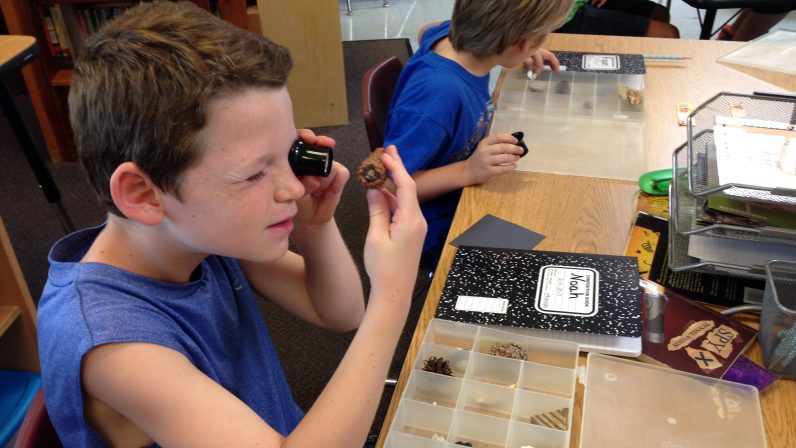In the spring we brainstormed taglines for marketing. One that popped up was “inspiring innovation since 1977.” When it came time to put together a new t-shirt design, it popped up again. As I worked on the design, the phrase hung around and it was apparent that, over the years, inspiring innovation has had many layers at the Seed. It’s a process that, in my mind, is worthy of becoming an intention. One thing led to the next and before our prep week was completed, we had an exciting focus for the year ahead.
As soon as innovation became an actual intention, all kinds of resources came into the picture. Being a TED talk frequenter, I found a clip of a school in the Bay Area called the Tinkering School (https://www.ted.com/talks/gever_tulley_s_tinkering_school_in_action). It reminded me of project days when I taught second grade students who are now walking through the door as parents. I came across a link to a talk by Derek Cabrera speaking about his students at a prestigious Ivy League school who don’t know how to think because they’ve spent most of their school lives prepping for tests (https://www.youtube.com/watch?v=dUqRTWCdXt4&noredirect=1). When Lesley, our 3rd/4th grade teacher, made a professional development presentation to the staff about iPad use in the classrooms, we watched a talk by Will Richardson (https://www.youtube.com/watch?v=Ni75vIE4vdk), who explained that there is a growing generation of children who are teaching themselves. Through internet access, they are learning to play the piano, develop skills as cinematographers and follow their passions. Will describes them as “children who are not waiting for a curriculum.”
One of the most helpful resources I found was an article called “Five Discovery Skills That Distinguish Great Innovators,” an excerpt from The Innovator’s DNA (Dyer, Gregersen, and Christensen, 2011). They describe five characteristics of innovators:
• associating – (connecting fields, problems or ideas that others find unrelated)
• questioning – (to understand how and why things are as they are and how they could be changed)
• observing – (to gain insights for new ways of doing things)
• networking – (talking with and listening to others who may have a radically diverse perspective on things)
• experimenting – (constantly trying out new experiences and piloting new ideas)
When I looked at this list, I saw the faces of generations of Awakening Seeds, many of whom are now parents, artists, writers, teachers, lawyers, doctors and engineers. Frequently I am told how much the Seed has influenced their lives, how the Seed taught them to think and love learning. They are innovators, changing their worlds in significant ways. There is nothing on this list that is new to the Seed. We are revisiting it because we value these qualities. We want to ensure that each child has frequent opportunities to ask questions, make connections, observe the world, try out new ideas and entertain diverse perspectives. Our hope is that they will grow up inspired, excited about learning and not having to wait for someone else to provide them with a meaningful, relevant curriculum.


Bingo!